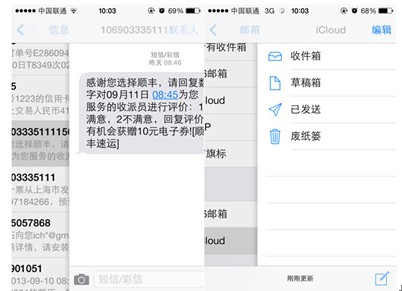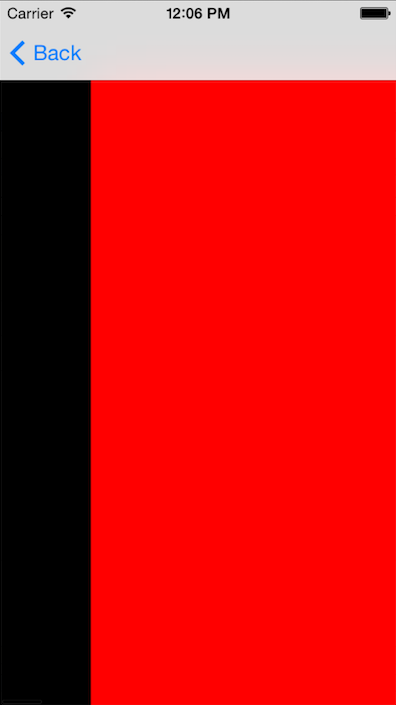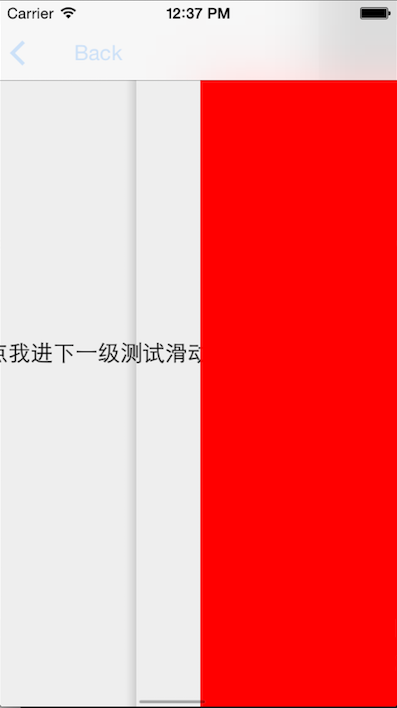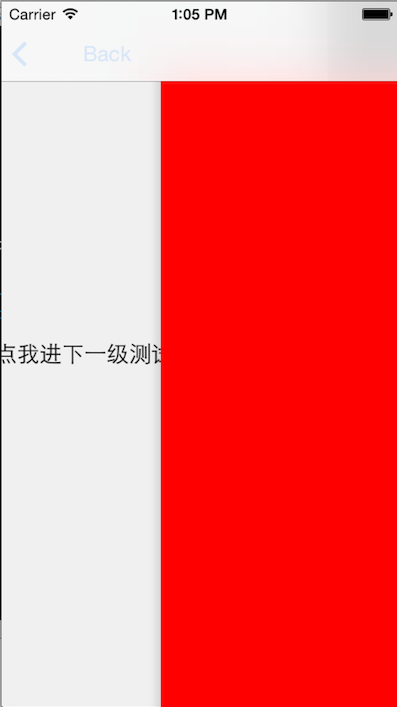iOS7下滑动返回与ScrollView共存二三事
【转载请注明出处】 = =不是整篇复制就算注明出处了亲。。。
iOS7下滑动返回与ScrollView共存二三事

【前情回顾】
去年的时候,写了这篇帖子iOS7滑动返回。文中提到,对于多页面结构的应用,可以替换interactivePopGestureRecognizer的delegate以统一管理应用中所有页面滑动返回的开关,比如在UINavigationController的派生类中
1 //我是一个NavigationController的派生类 2 - (id)initWithRootViewController:(UIViewController *)rootViewController 3 { 4 self = [super initWithRootViewController:rootViewController]; 5 if (self) 6 { 7 //在naviVC中统一处理栈中各个vc是否支持滑动返回的情况 8 //当前仅最底层的vc关闭滑动返回 9 self.interactivePopGestureRecognizer.delegate = (id<UIGestureRecognizerDelegate>)self; 10 } 11 12 return self; 13 }
然后在委托中控制滑动返回的开关
1 - (BOOL)gestureRecognizerShouldBegin:(UIGestureRecognizer *)gestureRecognizer 2 { 3 if (self.viewControllers.count == 1)//关闭主界面的右滑返回 4 { 5 return NO; 6 } 7 else 8 { 9 return YES; 10 } 11 }
【问题所在】
看上去挺美好的。。。。直到遇到了ScrollView。
替换了delegate后,在使用时ScrollView,在屏幕左边缘就无法触发滑动返回效果了,如图

【问题原因】
滑动返回事实上也是由存在已久的UIPanGestureRecognizer来识别并响应的,它直接与UINavigationController的view(方便起见,下文中以UINavigationController.view表示)进行绑定,因此上图中存在如下关系:
UIPanGestureRecognizer ——bind—— UIScrollView
UIScreenEdgePanGestureRecognizer ——bind—— UINavigationController.view
滑动返回无法触发,说明UIScreenEdgePanGestureRecognizer并没有接收到手势事件。
根据apple君的官方文档,UIGestureRecognizer和UIView是多对一的关系(具体点这里),UIGestureRecognizer一定要和view进行绑定才能发挥作用。因此不难想象,UIGestureRecognizer对于屏幕上的手势事件,其接收顺序和UIView的层次结构是一致的。同样以上图为例
(我是Z轴)-------------------------------------------------------------------------------------------------------------------------------------->
UINavigationController.view —> UIViewController.view —> UIScrollView —> Screen and User's finger
即UIScrollView的panGestureRecognizer先接收到了手势事件,直接就地处理而没有往下传递。
实际上这就是两个panGestureRecognizer共存的问题。
【解决方案】
苹果以UIGestureRecognizerDelegate的形式,支持多个UIGestureRecognizer共存。其中的一个方法是:
1 // called when the recognition of one of gestureRecognizer or otherGestureRecognizer would be blocked by the other 2 // return YES to allow both to recognize simultaneously. the default implementation returns NO (by default no two gestures can be recognized simultaneously) 3 // 4 // note: returning YES is guaranteed to allow simultaneous recognition. returning NO is not guaranteed to prevent simultaneous recognition, as the other gesture's delegate may return YES 5 - (BOOL)gestureRecognizer:(UIGestureRecognizer *)gestureRecognizer shouldRecognizeSimultaneouslyWithGestureRecognizer:(UIGestureRecognizer *)otherGestureRecognizer;
一句话总结就是此方法返回YES时,手势事件会一直往下传递,不论当前层次是否对该事件进行响应。
看看UIScrollView的头文件,有如下描述:
1 // Use these accessors to configure the scroll view's built-in gesture recognizers. 2 // Do not change the gestures' delegates or override the getters for these properties. 3 @property(nonatomic, readonly) UIPanGestureRecognizer *panGestureRecognizer NS_AVAILABLE_IOS(5_0);
UIScrollView本身是其panGestureRecognizer的delegate,且apple君明确表明不能修改它的delegate(修改的时候也会有警告)。
那么只好曲线救国。
UIScrollView作为delegate,说明UIScrollView中实现了上文提到的shouldRecognizeSimultaneouslyWithGestureRecognizer方法,返回了NO。创建一个UIScrollView的category,由于category中的同名方法会覆盖原有.m文件中的实现,使得可以自定义手势事件的传递,如下:
1 @implementation UIScrollView (AllowPanGestureEventPass) 2 3 - (BOOL)gestureRecognizer:(UIGestureRecognizer *)gestureRecognizer shouldRecognizeSimultaneouslyWithGestureRecognizer:(UIGestureRecognizer *)otherGestureRecognizer 4 { 5 if ([gestureRecognizer isKindOfClass:[UIPanGestureRecognizer class]] 6 && [otherGestureRecognizer isKindOfClass:[UIScreenEdgePanGestureRecognizer class]]) 7 { 8 return YES; 9 } 10 else 11 { 12 return NO; 13 } 14 }
再次运行demo,看看效果:
嗯,滑动返回已经成功触发,鼓掌!
等会等会。。。
好像不太对。。。
scrollView怎么也滚动了!!!!!
O。。。只是做到了将手势事件往下传递,而没有关闭掉在边缘时UIScrollView对事件的响应。
事实上,对UIGestureRecognizer来说,它们对事件的接收顺序和对事件的响应是可以分开设置的,即存在接收链和响应链。接收链如上文所述,和UIView绑定,由UIView的层次决定接收顺序。
而响应链在apple君的定义下,逻辑出奇的简单,只有一个方法可以设置多个gestureRecognizer的响应关系:
// create a relationship with another gesture recognizer that will prevent this gesture's actions from being called until otherGestureRecognizer transitions to UIGestureRecognizerStateFailed // if otherGestureRecognizer transitions to UIGestureRecognizerStateRecognized or UIGestureRecognizerStateBegan then this recognizer will instead transition to UIGestureRecognizerStateFailed // example usage: a single tap may require a double tap to fail - (void)requireGestureRecognizerToFail:(UIGestureRecognizer *)otherGestureRecognizer;
每个UIGesturerecognizer都是一个有限状态机,上述方法会在两个gestureRecognizer间建立一个依托于state的依赖关系,当被依赖的gestureRecognizer.state = failed时,另一个gestureRecognizer才能对手势进行响应。
所以,只需要
[_scrollView.panGestureRecognizer requireGestureRecognizerToFail:screenEdgePanGestureRecognizer];
即可。
再次运行demo,看看效果:
Works like a Charm!!
P.S:screenEdgePanGestureRecognizer是和UINavigationController.view绑定的,因此可以遍历UINavigationController.view.gestureRecognizers来获取,如下:
- (UIScreenEdgePanGestureRecognizer *)screenEdgePanGestureRecognizer { UIScreenEdgePanGestureRecognizer *screenEdgePanGestureRecognizer = nil; if (self.view.gestureRecognizers.count > 0) { for (UIGestureRecognizer *recognizer in self.view.gestureRecognizers) { if ([recognizer isKindOfClass:[UIScreenEdgePanGestureRecognizer class]]) { screenEdgePanGestureRecognizer = (UIScreenEdgePanGestureRecognizer *)recognizer; break; } } } return screenEdgePanGestureRecognizer; }
demo地址:https://github.com/cDigger/CoExistOfScrollViewAndBackGesture/tree/master
【总结】
写了这么多,只是为了最初统一管理滑动返回的一点点便利,似乎很有些得不偿失。
我并不建议直接在项目中使用这种非常规手段。
但使用apple君提供的积木,自己拼出系统中的新功能,也是iOS开发的乐趣之一啊。





 浙公网安备 33010602011771号
浙公网安备 33010602011771号